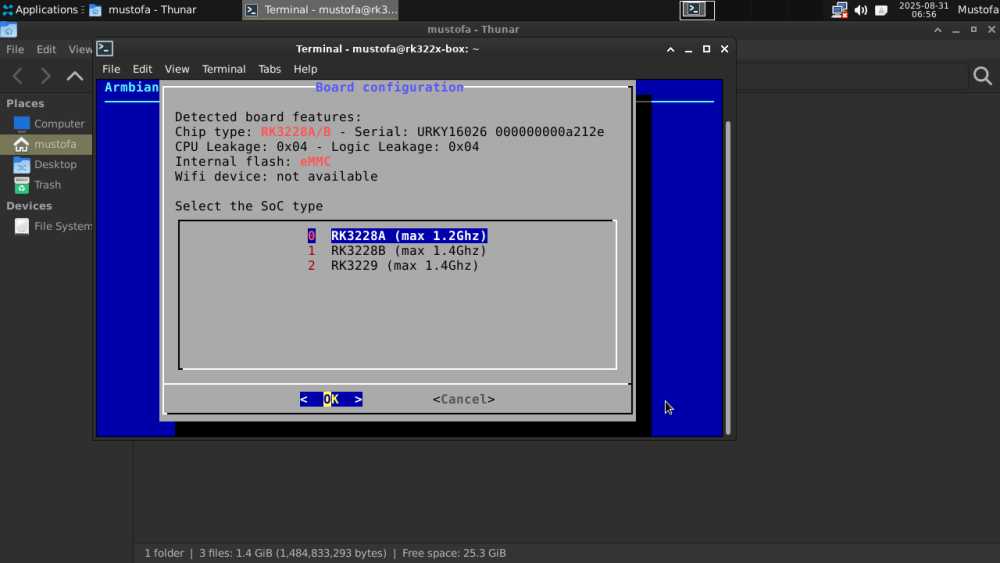Active threads
Showing topics posted in for the last 365 days.
- Past hour
-

Help wanted to test a new OpenVFD alternative
Jean-Francois Lessard replied to Jean-Francois Lessard's topic in Amlogic meson
@dale it seems like vfd-convert has not worked well. Perhaps because of some mix between script version and the template files version. Whatsoever, I've looked closer at the patch link you previously posted, this is the older pre-review dt-bindings syntax. You should be go to start with something like: /dts-v1/; /plugin/; #include <dt-bindings/gpio/gpio.h> #include <dt-bindings/leds/common.h> &{/} { display_client: spi { #address-cells = <1>; #size-cells = <0>; compatible = "spi-gpio"; sck-gpios = <&gpio 7 GPIO_ACTIVE_HIGH>; mosi-gpios = <&gpio 2 GPIO_ACTIVE_HIGH>; cs-gpios = <&gpio 12 GPIO_ACTIVE_LOW>; num-chipselects = <1>; display@0 { compatible = "fdhisi,fd628"; reg = <0x0>; spi-3wire; spi-lsb-first; spi-rx-delay-us = <1>; spi-max-frequency = <500000>; titanmec,digits = [00 01 02 03]; titanmec,segment-mapping = [03 01 02 06 04 05 00]; #address-cells = <2>; #size-cells = <0>; led@4,0 { reg = <4 0>; function = LED_FUNCTION_ALARM; }; led@4,1 { reg = <4 1>; function = LED_FUNCTION_USB; }; led@4,2 { reg = <4 2>; function = "play"; }; led@4,3 { reg = <4 3>; function = "pause"; }; led@4,4 { reg = <4 4>; function = "colon"; }; led@4,5 { reg = <4 5>; function = LED_FUNCTION_LAN; }; led@4,6 { reg = <4 6>; function = LED_FUNCTION_WLAN; }; }; }; }; Note that I haven't tested it, just made it from some copy-paste. If it doesn't work, even partially, you would most likely need to replace &gpio with the right reference to the gpio controller wired to the display. -
Hello, I am new to arm board, I had this android tv stick called S moon mx10 5G, it have rk322x cpu, 2GB Ram, and ap6330 wifi chip. I tried armbian on this device but wifi chip was not detected, I tried using "rockchip-rk3318-box-wlan-ap6330.dtbo" as user_overlyas, but still not working, could anyone tell me how to make this wifi chip working on rk322x armbian?. I attached some file for information: dmesg.txt s_moon_mx10_5g.dts
- Today
-

mxq pro 4k 5g allwinner h313 can't sd card boot
Ducdanh Nguyen replied to Ducdanh Nguyen's topic in Allwinner CPU Boxes
Do you mean gpu model? Like mail-g31? -
Disabling automount (drive letter assignment) in windows before flashing might help - probably it is mount time when windows is checking and changing partition table.
-
Hey Guys, I know this post is old but I have some questions. I was following @Jaybyrd's instructions and I have a question pertaining to the Plugin USB-C to the power on the device "I am assuming that is on The OPi5 device." Am I supposed to plug in something else? Because it says to open a terminal "what terminal? On what device?" Thank you for your time, Michael
-
I wouldn't be so categorical - I have rock pi 4b, which never saw android or any os other than armbian, which has same thing- two boot devices on emmc. Since it doesn't bother me, I didn't investigate further.
-
If the card still mounts, try running fsck first. If it’s clean but won’t boot, you can copy fresh /boot files from the same Armbian release. Otherwise, reinstalling to a new SD and restoring your data may be the safer route.
-
I faced a similar Ethernet throughput issue on Armbian under high latency. One thing that helped was using a USB Ethernet dongle instead of the onboard NIC. To simulate latency, you can use the tc command: sudo tc qdisc add dev eth0 root netem delay 200ms sudo tc qdisc del dev eth0 root For more solutions, check out this.
-
Hi, I am using Nanopi Neo board and I need RS485 driver to control DE pin automatically. I have prepared DTS Overlay file: /dts-v1/; /plugin/; / { compatible = "allwinner,sun8i-h3"; fragment@0 { target = <&uart1>; __overlay__ { status = "okay"; pinctrl-names = "default"; pinctrl-0 = <&uart1_pins &uart1_de_pin>; rs485-rts-gpios = <&gpio6 8 0>; /* PG8 active-low */ linux,rs485-enabled-at-boot-time; rs485-rts-delay = <0 300>; }; }; fragment@1 { target = <&uart2>; __overlay__ { status = "okay"; pinctrl-names = "default"; pinctrl-0 = <&uart2_pins &uart2_de_pin>; rs485-rts-gpios = <&gpio0 2 0>; /* PA2 active-low */ linux,rs485-enabled-at-boot-time; rs485-rts-delay = <0 300>; }; }; }; I produced dtbo file from dts one with the command: dtc -@ -I dts -O dtb -o rs485.dtbo rs485.dts I copied this rs485.dtbo file to /boot/dtb/overlay. Also I added rs485 string to ArmbianEnv.txt and rebooted. But only TX works, RX doesn't. What should I do else to make it work?
-
Hi! With latest edge 6.15.4 the board boots fine, shutdown also clean and complete but on reboot it does not again start up. Need to powercycle😒 I gets stuck et end of shutdown. Same for latest bookworm image (I think it's 6.12x). Earlier ones did work. => Any other board also affected? => Is for reboot the watchdog involved? T.
-

H3 cedrus video acceleration, device tree problem?
schunckt replied to schunckt's topic in Allwinner sunxi
Hi and thanks! Tested now but no luck. Compiled edge 6.15.4 Linux nanopiduo2 6.15.4-edge-sunxi #1 SMP Fri Jun 27 10:13:43 UTC 2025 armv7l GNU/Linux now i get Device creation failed: -14. [h264 @ 0x11f9b40] No device available for decoder: device type drm needed for codec h264. Stream mapping: Stream #0:0 -> #0:0 (h264 (native) -> wrapped_avframe (native)) Device setup failed for decoder on input stream #0:0 : Bad address [AVIOContext @ 0x11ac030] Statistics: 498846 bytes read, 0 seeks command as follows: ffmpeg -v trace -re -hwaccel drm -i Big_Buck_Bunny_720_10s_10MB.mp4 -f null - also tried fbdev output but same result. ffmpeg version is still ffmpeg -v ffmpeg version 5.1.7-0+deb12u1 Copyright (c) 2000-2025 the FFmpeg developers built with gcc 12 (Debian 12.2.0-14+deb12u1) configuration: --prefix=/usr --extra-version=0+deb12u1 --toolchain=hardened --libdir=/usr/lib/arm-linux-gnueabihf --incdir=/usr/include/arm-linux-gnueabihf --arch=arm --enable-gpl --disable-stripping --enable-gnutls --enable-ladspa --enable-libaom --enable-libass --enable-libbluray --enable-libbs2b --enable-libcaca --enable-libcdio --enable-libcodec2 --enable-libdav1d --enable-libflite --enable-libfontconfig --enable-libfreetype --enable-libfribidi --enable-libglslang --enable-libgme --enable-libgsm --enable-libjack --enable-libmp3lame --enable-libmysofa --enable-libopenjpeg --enable-libopenmpt --enable-libopus --enable-libpulse --enable-librabbitmq --enable-librist --enable-librubberband --enable-libshine --enable-libsnappy --enable-libsoxr --enable-libspeex --enable-libsrt --enable-libssh --enable-libsvtav1 --enable-libtheora --enable-libtwolame --enable-libvidstab --enable-libvorbis --enable-libvpx --enable-libwebp --enable-libx265 --enable-libxml2 --enable-libxvid --enable-libzimg --enable-libzmq --enable-libzvbi --enable-lv2 --enable-omx --enable-openal --enable-opencl --enable-opengl --enable-sdl2 --disable-sndio --enable-libjxl --enable-pocketsphinx --enable-librsvg --enable-libdc1394 --enable-libdrm --enable-libiec61883 --enable-chromaprint --enable-frei0r --enable-libx264 --enable-libplacebo --enable-librav1e --enable-shared libavutil 57. 28.100 / 57. 28.100 libavcodec 59. 37.100 / 59. 37.100 libavformat 59. 27.100 / 59. 27.100 libavdevice 59. 7.100 / 59. 7.100 libavfilter 8. 44.100 / 8. 44.100 libswscale 6. 7.100 / 6. 7.100 libswresample 4. 7.100 / 4. 7.100 libpostproc 56. 6.100 / 56. 6.100 Unfortunately there are countless forks of ffmpeg. I used the one from here https://forum.armbian.com/topic/32449-repository-for-v4l2request-hardware-video-decoding-rockchip-allwinner/ As of now I haven't found anything about a current kernel and ffmpeg working on any H3, only stuff back in 2019 and/or kernel 4.x 🙂 I also tried several extraargs=cma=### up to 256M but all same error. I really woud love to get some more tech background on "how stuff works" which may help me troubleshoot. => Can we enable debug output from the cedrus driver? How? => Can we enable debug output from thev4l2 layer? How? => Which libraries are involved, eg. v4l2request, other v4l2* which may need additional install/update? => Do in need v4l2-util / v4l2-ctl to configure some stuff? If yes, what exactly? (Remember, Its currently for file playback. I know about for cam capture) => Could the v4l2loopback help? => Can anybody confirm it really works on H3 maybe on an OrangePi board? If yes I can pull the Opi device tree and compare for possible differences. T. -
Everything you wish for here is achievable with pure U-Boot technology. A long time ago, I tried to practice how to realize this here in the forum, but my lesson from it was: You can't teach old dogs new tricks, and Armbian users want to celebrate their cargo cult and hope that it will magically fulfill their wishes.
- 8 replies
-
- Helios 4
- Nanopi Neo 3
-
(and 1 more)
Tagged with:
-

Is Netplan acting like hidden malware?
bushw replied to bushw's topic in Software, Applications, Userspace
I think Thunderbird, Firefox and other programs should configure firewall as well, of course without any information about that. - Yesterday
-

SSH connection slow. Is UsePAM=no safe?
ccs1664 replied to grixm's topic in Software, Applications, Userspace
I have a ssh connection with my TV BOX (it is a AMLOGIC with S912), in my etc/ssh/sshd_config I have "UsePAM yes" and without any delay for connection, and probably it was not the problem of your delay in the start connection. In addition, I installed a vnc service to work remotely using the graphical interface. Either ssh and vnc Viewer (xtightvncviewer in my Debian Desktop) run pretty well. Please, check your basic network services, as well, fix the IP in the TV BOX. In my case I did some adjusts such: cat /etc/network/interfaces auto lo iface lo inet loopback auto eth0 iface eth0 inet static address 192.168.15.22 netmask 255.255.255.0 gateway 192.168.15.1 dns-nameservers 8.8.8.8 1.1.1.1 There are some network services that can be impling in your delay by ssh (it is robust, old and fast application of Linux) I hope to help you too. -
Hi everyone, i manage to extract the .dtb file from the recovery partition of the rk3528-X88pro13-android. This is the board number : X88PRO 13-D4-V1.1 (2023-04-12). Maybe it will be useful to someone 😉 rk3528-x88pro13-android.dtb
-

Can't enable UART overlay on OrangePi Zero 3
Telegraphist replied to leon22's topic in Allwinner sunxi
Overlay was renamed at some point to just uart5 `/boot/dtb/allwinner/overlay/sun50i-h616-uart5.dtbo` (without `ph5`), so `overlays=uart5` works and is available at /dev/ttyS1 -

Armbian + DHT11: what am I missing?
laibsch replied to Jordan1x's topic in Software, Applications, Userspace
Providing logs with armbianmonitor -u helps with troubleshooting and significantly raises chances that issue gets addressed. -
hi, I am unable to boot Armbian on Gamebox G11 Pro. I am able to boot CoreElec and Emuelec easily via sd card. I have tried every tip and trick to boot it, lot of Armbian versions and forks. Can you suggest a suitable armbian dtb file for the same. The most reliable method to boot it.
-

CSC Armbian for RK3318/RK3328 TV box boards
Adam Smith replied to jock's topic in Rockchip CPU Boxes
Great to see continued development for RK3318/RK3328 boards, Armbian support really helps unlock their full potential for lightweight Linux projects. -
@usual user The USB and Ethernet ports are exposed, but how would that work exactly? I don't know how to make the software boot from USB or Ethernet and even if I did I don't know what to boot into that can write an image file to the emmc chip. I can find no info on this on radxa or armbian sources.
-
When you do first login, you need to choose correct locales combination and language in desktop should follow - you still need to install desktop packages ... If you don't have locales support in the system, you won't be able to use it in desktop. I think this is the problem. In my case, when I select my own locales (sl_SI.UTF-8) and install those desktop related packages, I have Gnome with Slovene support.
-

RPi5 Armbian_25.2.x upgrade: Unsupported initramfs version
Werner replied to ChrisO's topic in Raspberry Pi
RPi added some checks in their initramfs post-update script which causes this, found here: /etc/initramfs/post-update.d/z50-raspi-firmware: case $flavour in v8|v8-rt|2712|v6|v7|v7l) ;; *) echo "ERROR: Unsupported initramfs version ($initrd_version)" exit 0 ;; esac However there is also another fine in this folder which was added years ago: https://github.com/armbian/build/pull/6039/files#diff-02b9b6fbb77fcab23278cd4a148b3f2c91d2c1361d05f33a21bdab19182caf21R139-R153 That seems to handle initramfs creation properly. So the error message is purely cosmetical. That would give trouble when updating rpi packages from upstream since there would be changes detected. Better solution might be to add a hint to our code stating that the ERROR can be ignored as long as overall initramfs generation was successful. -

HDMI audio and analog audio do not work on Opi5Plus
The Tall Man replied to ずっと一人's topic in Orange Pi 5 Plus
Additional Info: The "Current" Kernel I found the equivalent code in the Current kernel. It is a clearly a different version of the file, but it looks like the same error is present. I have not tested it. Snippet Source: ./build/cache/sources/linux-kernel-worktree/6.12__rockchip64__arm64/arch/arm64/boot/dts/rockchip/rk3588-orangepi-5-plus.dts &analog_sound { pinctrl-names = "default"; pinctrl-0 = <&hp_detect>; simple-audio-card,aux-devs = <&speaker_amp>, <&headphone_amp>; simple-audio-card,hp-det-gpios = <&gpio1 RK_PD3 GPIO_ACTIVE_LOW>; // This line here: Change GPIO_ACTIVE_LOW to GPIO_ACTIVE_HIGH simple-audio-card,widgets = "Microphone", "Onboard Microphone", "Microphone", "Microphone Jack", "Speaker", "Speaker", "Headphone", "Headphones"; The "Vendor" Kernel I found the equivalent code in the Vendor kernel's devicetree. It is also a clearly different version of the file from the other two kernel trees. But it looks like this particular coding error (for the audio) is not present here. The headphone detection level is set to GPIO_ACTIVE_HIGH. Source: ./build/cache/sources/linux-kernel-worktree/6.1__rk35xx__arm64/arch/arm64/boot/dts/rockchip/rk3588-orangepi-5-plus.dts However in my experience (tested again just now with version 28.5.1), the Vendor kernel seems a bit crippled: No GPU or video acceleration, and no ES8388 analog audio whatsoever (not even at the ultra-low volume I was getting with the Edge kernel). At least the screen, keyboard, mouse, and ethernet works, but with no video acceleration the video is slow and clumsy. I suspect that the best place to look for the audio issue with the Vendor kernel is not to focus on the audio, so much as to focus on what broke on an apparently deeper level. - Last week
-
still on windows , but microsoft suggests 11 so looking for linux 11





